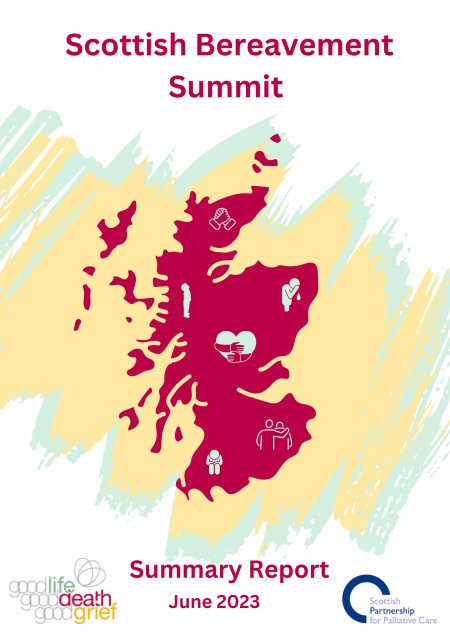Grieving Scots need more support says Scottish Bereavement Summit
- Area of Work: The ALLIANCE
- Type: News Item
- Published: 3rd July 2023

A new report draws attention to the difficulties faced by people who are grieving in Scotland.
The Covid-19 pandemic has left many bereaved people with unresolved issues that impact negatively on their wellbeing. Wider societal issues, such as the energy crisis and the cost of living crisis are also worsening people’s experiences of bereavement.
“Bereavement is always difficult but Covid-19 made things even harder for people. Many couldn’t be with dying loved ones and then had to cope with the bereavement in isolation, without access to the support of family and friends. This has left a legacy of loss, which is being made even worse by the stress and anxiety created by wider factors like worrying about the cost of living.” said Donald Macaskill, Chair of the Scottish Bereavement Charter Group.
The new report is a result of the Scottish Bereavement Summit that took place last October, where bereavement professionals from across Scotland met to explore ways of improving bereavement experiences in Scotland.
The Summit found that bereaved people face many barriers to accessing bereavement services, and that many people aren’t aware of the support that is available.
In addition, bereaved people often don’t get the informal support they need from friends, family and their local community, with workplaces and schools highlighted as places where improvement is needed.
“When going through difficult times, many of us draw strength from the people around us – our family, friends or other communities we’re part of. But if those people are anxious or unsure about what to do or say around someone who is bereaved, it can mean the person is left feeling even more isolated.” said Mark Hazelwood, CEO, Scottish Partnership for Palliative Care.
The Bereavement Summit Report, launched today, sets out recommendations of how experiences of bereavement can be improved in Scotland.
“The recommendations all came out of discussions at the Bereavement Summit, so are informed by people who are involved day-to-day in providing bereavement support and who want to help make things better for bereaved people. Together we tried hard to develop practical, do-able recommendations that can really make a difference.” said Rebecca Patterson, Director of Good Life, Good Death, Good Grief.
A key recommendation is the creation of a National Bereavement Strategy, and the clear allocation of overarching responsibility for bereavement to a Scottish Government Minister.
The recommendations also suggest ways of helping schools and workplaces to become more supportive of bereaved people, as well as ways to encourage more equitable access to formal bereavement services.
Find out more about the Scottish Berevement Summit final report at Good Life, Good Death, Good Grief.
End of page.
End of page.
You may also like:
The ALLIANCE has published a report on people's experiences of accessible information around Self-directed Support and social care.
Continue readingAdapting to climate change is essential, but pressures on sectors including the third sector are currently limiting the capacity to engage.
Continue readingThe Bill should explicitly embed the social model of disability, intersectionality, human rights based and person centred approaches.
Continue readingDisabled people continue to face heightened challenges associated with higher energy bills, including risks to health and wellbeing.
Continue readingAmendments to the Scotland Act are necessary to ensure the Scottish Parliament can fully incorporate human rights in devolved areas.
Continue readingThe Nursing and Midwifery Council want to identify good practice, innovation and collaboration within nursing and midwifery.
Continue readingThe ALLIANCE has responded to the Scottish Government's consultation on the Good Food Nation Plan and Specified Functions.
Continue readingA new pan-Scotland research project raises the awareness of the real-life challenges and uncertainties faced by unpaid carers.
Continue readingHealthcare Improvement Scotland are looking for members and a Chairperson for their new Standards Development Group.
Continue readingHealth content creators can now apply for the only independently-assessed quality mark for print and digital health information.
Continue readingALLIANCE statement on the negative impact of economic policy and public finance decision-making
Continue readingSelf Management Week will run from 23-26 September. If you would like to host an event or become involved just get in touch with us.
Continue readingThe ALLIANCE responds to Health Improvement Scotland's survey on the proposed National Healthcare Standards.
Continue readingWe want to hear from you on what you think about our draft response to the LDAN Bill, and what else you would like included.
Continue readingOur content collaborates with guests from across health and social care to explore lived experience, good practice and emerging policy.
Continue readingThe ALLIANCE has published a report to inform the next See Hear Strategy.
Continue readingTake part in a research study run by Kings College London to trial a new online peer support platform that supports self management.
Continue readingWatch the Health and Social Care Academy's latest Ambitions case study, looking at how Social Security Scotland are reimagining investment.
Continue readingRead the full report on Anti-Seizure Medicines (ASMs) prescribed to females aged 0 to 54, and pregnant women in Scotland.
Continue readingThe ALLIANCE is pleased to publish a visual resource in support of the Scottish Government’s Women’s Health Plan.
Continue readingCatch up on the various videos and podcasts that have been released throughout March as part of ALLIANCE Live.
Continue readingDiabetes UK are recruiting healthcare professionals to volunteer at their Type 1 diabetes camp in Perth and Kinross for 11 to 15 year olds.
Continue readingFind out about how to become a public committee member for the National Institute for Health and Care Research and what the role entails.
Continue readingThe ALLIANCE has responded to the Equalities, Human Rights and Civil Justice Committee inquiry on the Suicide Prevention Strategy 2022-2032
Continue readingEvery Tuesday the Discover Digital team at the ALLIANCE shares a free and trusted digital tool that supports health and wellbeing.
Continue reading